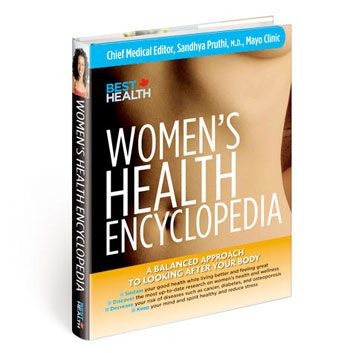
1. Eat right
The bottom line is, we eat too much. Cut back on portions and aim for four to six small meals a day that all include a source of protein-such as lean meat, fish or nuts-to help normalize your blood sugar and keep you full.
Eat unrefined whole foods as close to their natural state as possible and limit your intake of processed and preservative-heavy foods such as boxed items, deli meats and frozen dinners, says Cara MacMullin, doctor of naturopathic medicine at Totum Life Science in Toronto. Choose whole grains such as brown rice, quinoa and whole wheat, and minimize consumption of sugar and other sweeteners.
Also make sure to eat a variety of foods from each food group. “Eating the same foods every day will limit your intake of certain nutrients and may contribute to the development of intolerances,” says MacMullin. Include five to seven daily servings of vegetables (including one serving of cruciferous veggies such as broccoli, Brussels sprouts or cabbage) and two to three servings of fruit.
2. Get your D
The higher the levels of vitamin D in the blood, the lower the risk of developing colorectal, breast and prostate cancers, according to the latest research. The Canadian Cancer Society recommends a daily vitamin D supplementation of 1,000 IU during the fall and winter months with special consideration for adults at risk for having a deficiency. In warmer and brighter months, you can get your vitamin D through sun exposure: a few minutes a day or more, depending on your age, the time of day and your skin colour.
MacMullin advises getting your vitamin D levels tested in the spring, as this typically reflects your lowest vitamin D status and can help determine your optimal dosing schedule. Ask your doctor for more information.
2. Get your D
The higher the levels of vitamin D in the blood, the lower the risk of developing colorectal, breast and prostate cancers, according to the latest research. The Canadian Cancer Society recommends a daily vitamin D supplementation of 1,000 IU during the fall and winter months with special consideration for adults at risk for having a deficiency. In warmer and brighter months, you can get your vitamin D through sun exposure: a few minutes a day or more, depending on your age, the time of day and your skin colour.
MacMullin advises getting your vitamin D levels tested in the spring, as this typically reflects your lowest vitamin D status and can help determine your optimal dosing schedule. Ask your doctor for more information.

2. Get your D
The higher the levels of vitamin D in the blood, the lower the risk of developing colorectal, breast and prostate cancers, according to the latest research. The Canadian Cancer Society recommends a daily vitamin D supplementation of 1,000 IU during the fall and winter months with special consideration for adults at risk for having a deficiency. In warmer and brighter months, you can get your vitamin D through sun exposure: a few minutes a day or more, depending on your age, the time of day and your skin colour.
MacMullin advises getting your vitamin D levels tested in the spring, as this typically reflects your lowest vitamin D status and can help determine your optimal dosing schedule. Ask your doctor for more information.

3. Exercise
Incorporate at least 30 minutes of physical activity into every day. Make sure to incorporate activities that include endurance (biking, walking), flexibility (yoga, golf) and strength (weight training).
For women, it is imperative that exercise include an intense resistance component and not just a cardio focus, says Dev Chengkalath, a physiotherapist at SHAPE Toronto. “This is important for osteoporosis prevention, boosting metabolism and facing the daily challenges presented by life.” Try circuit training, a body-sculpting workout that will get your heart rate up and your muscles working.
4. Get enough sleep
Sleep is vital in maintaining good health and quality of life. Without it, you become more susceptible to health problems such as heart disease, stroke and diabetes. On average, adults will function best after seven to nine hours of shut-eye, but quality is just as important as quantity, says Chengkalath. The best measure is how you feel when you wake up. If your insomnia is persistent, talk to your doctor, as a medical condition or the medications you’re taking may be affecting your rest.
4. Get enough sleep
Sleep is vital in maintaining good health and quality of life. Without it, you become more susceptible to health problems such as heart disease, stroke and diabetes. On average, adults will function best after seven to nine hours of shut-eye, but quality is just as important as quantity, says Chengkalath. The best measure is how you feel when you wake up. If your insomnia is persistent, talk to your doctor, as a medical condition or the medications you’re taking may be affecting your rest.

4. Get enough sleep
Sleep is vital in maintaining good health and quality of life. Without it, you become more susceptible to health problems such as heart disease, stroke and diabetes. On average, adults will function best after seven to nine hours of shut-eye, but quality is just as important as quantity, says Chengkalath. The best measure is how you feel when you wake up. If your insomnia is persistent, talk to your doctor, as a medical condition or the medications you’re taking may be affecting your rest.

5. De-stress
According to Health Canada, stress is a risk factor in heart disease, mental illness and weight changes. “It’s typically not the amount of stress that’s the problem, but how you deal with it,” says Chengkalath. “Managing stress is the key to harvesting the benefits while minimizing the health risks.”
So what can you do? Work out a strategy for dealing with stresses that occur in your life-seek the help of a friend or professional if you’re having trouble doing it on your own. And make sure to schedule “fun time” in your calendar-even a quick coffee break with your favourite coworker or 15 minutes outside in the sun can recharge your batteries and make you calmer and happier.

Best Health Women’s Health Encyclopedia
Written by women physicians especially for women. Yes! We do respond differently to symptoms and treatments than men do. Get the all-in-one book you can turn to, with the answers you need and the advice you can count on. Reduce your risk for breast cancer, diabetes and depression, while you cultivate a healthy spirit and mind.
Plus, enjoy free shipping if you order by December 31!
